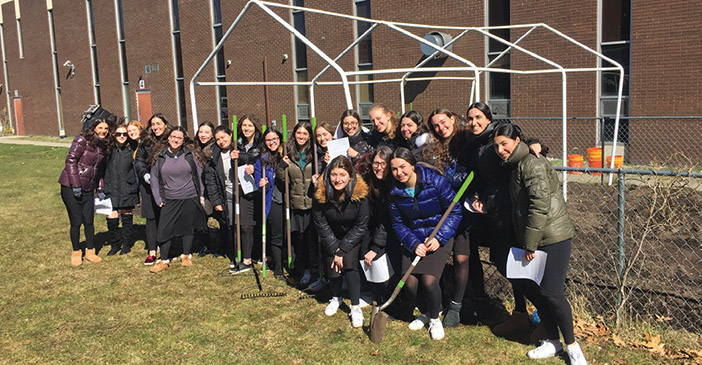


Spring has finally sprung and Ma’ayanot has taken their learning outdoors to their new garden, where they are tilling the soil and sowing the seeds of Torah study. The garden is a collaborative effort between the school and experiential educator Yosef Gillers, founder of Grow Torah, which develops educational Torah garden programs for schools and communal organizations.
At Ma’ayanot, Gillers met with Judaic Studies faculty across the curriculum to integrate the gardening program into classroom lessons. For example, 11th graders are studying kashrut in Halacha, specifically how a spicy item can affect the kashrut status of different foods. “We studied some plant science and differentiated between mar (bitter) and charif (sharp) and how those factors affect kashrut,” said Gillers. “Wild onions are spicy, while dandelion greens are bitter. In the garden, we planted plants that are charif—onions, scallions and shallots.”
Halacha teacher Yael Weil enjoyed the hands-on lessons with her students. “Mr. Gillers gave us a demonstration of charif foods, helped us classify them and shed some light on some extinct plants discussed in the Gemara we read on the topic. It was very fun and informative.”
In Tanach, Ma’ayanot seniors are learning sefer Bereishit. “We explored the meaning of l’avdah u’leshomra (to work and to protect) the land, what that commandment meant for Adam and Chava and what it means for us today,” said Gillers, who has an undergraduate degree in environmental studies from Washington University in St. Louis, and spent five learning in the semicha program at Yeshiva University. “There is a tension between working the land and protecting it by being good environmental stewards. The seniors are working the land by tilling soil, building beds, planting and composting. We’re also protecting the land by creating a pollinator meadow, a habitat for pollinators like bees and butterflies.”
Students work in the garden during their regularly scheduled class period. They will harvest their produce, taste what they’ve grown and donate it to the Center for Food Action.
“Mr. Gillers is very passionate about the earth and its produce,” said Weil. “He’s extremely knowledgeable and able to seamlessly incorporate Torah and appreciation of Hashem’s world in his lessons.”










